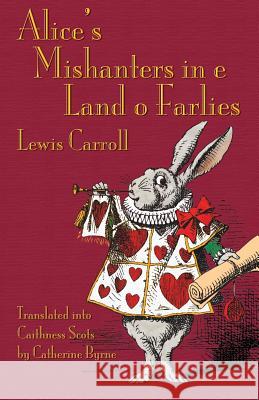Alice's Mishanters in e Land o Farlies: Alice's Adventures in Wonderland in Caithness Scots » książka
Alice's Mishanters in e Land o Farlies: Alice's Adventures in Wonderland in Caithness Scots
ISBN-13: 9781782010609 / Szkocki / Miękka / 2014 / 136 str.
When Charles Lutwidge Dodgson set out one afternoon in July 1862 to invent a story about a girl disappearing down a rabbit hole, he could never have guessed that some 150 years later so many people would still be so entranced by the product of his imagination. Sunshine on the river, three little girls being rowed leisurely along and begging to hear a story, and the young clergyman at the oars turning to look over his shoulder at Alice at the helm, and saying: "Alice was beginning to get very tired of sitting by her sister on the bank..." To tackle a translation of the first book into the Caithness dialect of Scots to be part of this great project was a challenge. Catherine Byrne met it by imagining how her mother, reading the book aloud, would have sounded - "hearing my mother's voice in my head," as she put it in an e-mail to this writer. The result is engaging and amusing, and those familiar with the Caithness accent will recognize the achievement at once. Catherine Byrne's rendering of Alice into the dialect is very welcome. We hope that readers will enjoy it. Dodgson loved wordplay and we think that he would have been intrigued to hear his work in a dialect and accent he almost certainly never encountered. Welcome to "Alice's Mishanters in e Land o Farlies."
When Charles Lutwidge Dodgson set out one afternoon in July 1862 to invent a story about a girl disappearing down a rabbit hole, he could never have guessed that some 150 years later so many people would still be so entranced by the product of his imagination. Sunshine on the river, three little girls being rowed leisurely along and begging to hear a story, and the young clergyman at the oars turning to look over his shoulder at Alice at the helm, and saying: "Alice was beginning to get very tired of sitting by her sister on the bank..." To tackle a translation of the first book into the Caithness dialect of Scots to be part of this great project was a challenge. Catherine Byrne met it by imagining how her mother, reading the book aloud, would have sounded - "hearing my mothers voice in my head", as she put it in an e-mail to this writer. The result is engaging and amusing, and those familiar with the Caithness accent will recognize the achievement at once. Catherine Byrnes rendering of Alice into the dialect is very welcome. We hope that readers will enjoy it. Dodgson loved wordplay and we think that he would have been intrigued to hear his work in a dialect and accent he almost certainly never encountered. Welcome to "Alices Mishanters in e Land o Farlies".











